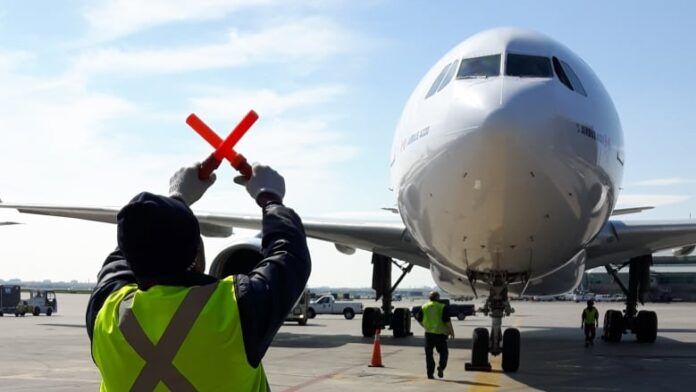Canadian airlines and the country’s regulator are defending aviation safety in the country after the International Civil Aviation Authority (ICAO) gave Canada a C in its implementation of international safety standards. The confidential report, obtained by the Canadian Press news agency, gave Canada a score of 64 out of 100 according to CH-Aviation. A similar audit in 2005 rated Canada at 95 out of 100. The report apparently said Canada’s aircraft operations, airports and air navigation only barely make the grade. The audit recommends Transport Canada set up systems to monitor regulatory compliance by airlines and ensure proper training and fatigue management for air traffic controllers. The low score prompted quick reaction from Transport Canada and the country’s two largest airlines.
“ICAO has not identified any significant safety concerns with Canada’s civil aviation system, and we know our country’s air sector is among the safest in the world,” Transport Ministry spokeswoman Laura Scaffidi told the publication. Air Canada said in a statement that the ICAO document “was not an audit of the safe operation of Canadian aircraft.” The airline said it was recently audited by the International Air Transportation Association and “passed with exemplary findings.” WestJet said the audit focused on Transport Canada and not Canadian operators “and therefore do not assess or reflect WestJet’s industry leading safety standards.”




































Defend, deflect and deny
That is the way of any authoritarian government.
They do the same as their airlines ignore US laws and fly domestic US routes too.
Makes you wonder where the infrastructure money got diverted to or from. You can pretend all you want, but the facts point to a nation in distress.
Makes one almost not mind flying on Spirit…
Lol +1
I’d like to see the report before I comment. What categories were low? Were there any items that were high or average?
Agree – the report seems scathing yet Transport Canada makes it sound like perhaps only a shortage of peanuts on short haul flights- given what’s happening in the US with the recent close calls I wonder if the issue is more pervasive than we’d like to admit
I feel the problem is much deeper worldwide, since there have been more recent close calls seemingly everywhere. I don’t think it’s so much the operators or systems themselves as it is a loss of qualified personel (either from people retiring, or from getting out of the business altogether).
I agree. It’s premature to comment until we know what the report actually says.
When it comes to depending on ground-based services, I don’t worry too much. The safety of my operations depend on ME and not any ground-based service. Whether or not ATC is present, whether or not the navaids are working, it is still up to me to complete the flight safely … or not.
So, when landing at a busy airport, it is STILL up to me to maintain situational awareness and avoid a terminal “loss of separation”. When flying long distances, it is still up to me to navigate safely, avoid dangerous weather and CFIT, in order to arrive safely. Everything else is just window dressing. Sure having ATC there to help (for varying values of ‘help’ — the UK is the worst in my book) is nice and it is part of my CRM, but I am never willing to abdicate my my responsibility and just hand over responsibility and control to Tower or TRACON.
I guess what I am saying is, it really doesn’t matter much WHAT the ICAO says.
My experience is the exact opposite. I flew my Mooney into Vancouver and Victoria area airports 3 times last summer and was impressed by the controllers at Boundary Bay, Pitt Meadows, and Victoria International. They were competent and friendly, and combine that with the great GA facilities it left me with a very positive impression.
Hmmm… Transport Canada has, in the past years, downloaded a huge amount of oversight responsibilities to the “operators”. To wit…. ramp checks and many operator “audits” are a thing of the past. They simply do not have the resources, bodies or experience to handle the job. The checks and balances (plus the “audit trail” they have on EVERY (however small) inquiry) now make their best efforts burdensome. Many of their positions are now filled with new people with limited or no aviation exposure, let alone experience. When there is the occasional “dustup”, like the Citation crash out West a few years ago, where the operator used a single pilot for the flight and had not been inspected for many years, we get lots of information about how things will change. Many deficiencies were found, of course, AFTER the incident, and the storm only ensued because some very important people were on the flight. Changes were planned, but never implemented. These changes were outlined at a COPA seminar that I attended, and after expanding on the plan, direct (and VERY directed) questioning by myself and others finally resulted in the presenter admitting they had neither the budget or personnel to take it anywhere. A guess for sure, but I have reason to think this lack of “oversight” on the Canadian aviation world MAY be where ICAO have some of their concerns
I wonder how many of Transport Canada’s woes stem from the fact that it is a private contractor and not a government agency? Put another way, are those who think that private ATC and other flight services are better than government services wrong? FWIW, I have rarely had a problem with US ATC and other FAA services, but when I have flown in Canada, I had little problem with them either, although the last time I flew in Canada was about 7 years ago and they may have changed.
Chris, Transport Canada (the regulator) is very much a department of Canada’s federal government. You are confusing it with Nav Canada, a private not-for-profit entity that runs the air navigation system (i.e., ATC).
Steve, it is possible that might be one of the issues involved here. Since TC is the regulator and NC is the operator, the interplay between them might be where some of the discrepancies may lie. ICAO may expect more oversight (or more documentation and internal auditing) than they can observe from TC’s operations. Government regulation of a quasi-civilian organization can be a challenging proposition. Just look at the US Congresses’ “oversight” of the American Postal System.
If I got 64 out of 100 on the written test then I would not have a certificate.
I guess 64 is “safe” in Canada?
Maybe it’s different in the metric system, eh?
I too would like to read the actual report before passing judgement on the findings. However, I have in the past been involved in similar audits for ISO standards (i.e. ISO 9000 and 14000), and I wonder if the ICAO follows a similar pattern. The ISO (a predominantly European based system) emphasizes documentation and paperwork more than actual performance or results. In other words, you may be meeting the intent of a standard, but lack acceptable paper trails to prove you are doing so. That approach is very labor intensive in documentation (lots of internal audits and record keeping) to actually PROVE you are doing the right things. If that is the case, the downgrades may be more of a lack of formal documentation or direction than actual failures to perform. Will be interesting to see.
This result is not at all surprising on account of how many TC aviation safety executives were pulled from their regular work to implement some ridiculous mandate on aviation personnel and passengers that had nothing to do with aviation safety.